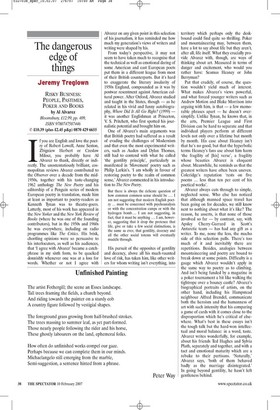The dangerous edge of things
Jeremy Treglown RISKY BUSINESS: PEOPLE, PASTIMES, POKER AND BOOKS by Al Alvarez Bloomsbury, £12.99, pp. 409, ISBN 9780747587446 © £1039 (plus £2.45 p&p) 0870 429 6655 1 f you are English and love the poetry of Robert Lowell, Anne Sexton, Zbigniew Herbert or Czeslaw Milosz, you probably have Al Alvarez to thank, directly or indirectly. The unostentatiously brilliant, cosmopolitan reviews Alvarez contributed to the Observer over a decade from the mid1950s, together with his taste-changing 1962 anthology The New Poetty and his editorship of a Penguin series of modern European poetry in translation, made him at least as important to poetry-readers as Kenneth Tynan was to theatre-goers. Latterly, most of his work has appeared in the New Yorker and the New York Review of Books (where he was one of the founding contributors), but in the 1950s and 1960s he was everywhere, including on radio programmes like The Critics. His brisk, chortling opinions were so persuasive to his interlocutors, as well as his audiences, that 'I agree with Alvarez' became a catchphrase in my sixth form, to be quacked donnishly whenever one was at a loss for words. Whether or not I agree with Alvarez on any given point in this selection of his journalism, it has reminded me how much my generation's views of writers and writing were shaped by his.
From today's perspective, it may not seem to have taken much to recognise that the technical as well as emotional daring of some American and east European poets put them in a different league from most of their British counterparts. But it's hard to exaggerate the literary insularity of 1950s England, compounded as it was by postwar resentment against American cultural power. After Oxford, Alvarez studied and taught in the States, though — as he related in his vivid and funny autobiography, Where Did It All Go Right? (1999) — it was another Englishman at Princeton, V. S. Pritchett, who first spotted his journalistic potential and brought him on.
One of Alvarez's main arguments was that British poetry had suffered as a result of evading the challenges of Modernism and that even the most experimental writers, such as Auden and Dylan Thomas, still had to contend with what he called `the gentility principle', particularly as manifested in 'Movement' poetry such as Philip Larkin's. 'I am wholly in favour of restoring poetry to the realm of common sense,' Alvarez commented in his introduction to The New Poeby.
But there is always the delicate question of how common common sense should be .... I am not suggesting that modern English poetry ... must be concerned with psychoanalysis or with the concentration camps or with the hydrogen bomb.... I am not suggesting, in fact, that it must be anything .... I am, however, suggesting that it drop the pretence that life, give or take a few social distinctions, is the same as ever, that gentility, decency and all the other social totems will eventually muddle through.
His pursuit of the opposites of gentility and decency, above all his much-vaunted love of risk, has taken him, like other writers for whom writing isn't everything, into territory which perhaps only the deskbound could find quite so thrilling. Poker and mountaineering may, between them, have a lot to say about life but they aren't, after all, life itself. What they crucially provide Alvarez with, though, are ways of thinking about art. Measured in terms of danger and excitement, who would you rather have: Seamus Heaney or John Berryman?
Put that crudely, of course, the question wouldn't yield much of interest. What makes Alvarez's views powerful, and what forced younger writers such as Andrew Motion and Blake Morrison into arguing with him, is that — a few memorable phrases apart — he doesn't oversimplify. Unlike Tynan, he knows that, in the arts, Premier League and First Division can be hard to separate and that individual players perform at different levels not only over a lifetime but month by month. His case about Heaney isn't that he's no good, but that the hyperbolic terms Heaney's fans use about him harm 'the fragility of [his] verse', a fragility whose beauties Alvarez is eloquent about. Meanwhile, he reminds us that the greatest writers have often been uneven. Coleridge's reputation 'rests on five poems ... less than ten per cent of his poetical works'.
Alvarez always cuts through to simple, neglected sense. Who else has noticed that although manned space travel has been going on for decades, we still know next to nothing about what it's like? The reason, he asserts, is that none of those involved so far — by contrast, say, with Apsley Cherry-Garrard in Scott's Antarctic team — has had any gift as a writer. To me, none the less, the macho side of this selection palls. There's too much of it and inevitably there are repetitions. Besides, analogies between mountaineering and poetry are bound to break down at some points. Difficulty is a gauge which Alvarez wouldn't apply in the same way to poetry as to climbing. And isn't being funded by a magazine in a poker tournament a bit like walking the tightrope over a bouncy castle? Alvarez's biographical portraits of artists, on the other hand, including his Hampstead neighbour Alfred Brendel, communicate both the heroism and the humanness of art with such intensity that his comparing a game of cards with it comes close to the disproportion which he's critical of elsewhere. What's best in these essays isn't the tough talk but the hard-won intellectual and moral balance: in a word, taste. Alvarez writes wonderfully, for example, about his friends Ted Hughes and Sylvia Plath, separately and together, and with a tact and emotional maturity which are a rebuke to their partisans. 'Naturally,' Alvarez says, 'both of them behaved badly as the marriage disintegrated.' In going beyond gentility, he hasn't left gentleness behind.













































 Previous page
Previous page